2016 Postmortem
In reply to the discussion: What does this mean? I am not feeling this at all! [View all]RiverLover
(7,830 posts)Bernie Sanders on Racial Justice
Tackling structural inequality is at the heart of Bernie Sanders’ campaign, and at the foundation of this policy is his belief that we must address what he calls the “parallel problems” of economic disparity and institutional racism. The imbalance inherent in America’s institutions — whether our education, healthcare, immigration or criminal systems — point to a fundamental lack of justice for America’s people of color.
Bernie has long worked to address intrinsic and explicit racism from multiple angles. His extensive record as an advocate of racial justice goes back to his activism in the Civil Rights Movement in the 1960’s. He is proud to have marched on Washington with Martin Luther King, Jr. and watch him give his “I Have a Dream” speech. Bernie was also a student leader of the Congress of Racial Equality when he was arrested for protesting institutional segregation. Throughout his three decades in public service, Bernie has both been vocal on issues related to racial justice and voted to support those views — a legislative record that’s earned him a 100 percent rating from the ACLU and a 100 percent from the NAACP.
Bernie believes racial justice is so important, and so intertwined with his vision for America, that racial justice has its own issue page on his campaign’s website. In it, he details how to address different kinds of violence perpetrated against people of color: physical, legal, political, and economic.
https://berniesanders.com/issues/racial-justice/
Criminal Justice: The American justice system is crippled by over-incarceration, disenfranchisement, and poor prison conditions, and people of color are disproportionately affected by this situation. A total rehaul is required.
Economic Justice: People of color face systemic discrimination in every aspect of our economy, from education to hiring to compensation. We must create more jobs, raise the minimum wage, and increase access to education and training. We must also expand social safety net programs and guarantee affordable healthcare and nutrition programs so that we enable working families of color to get ahead.
Voting Rights: State by state, our voting rights are increasingly under attack. Various voter suppression tactics very directly affect people of color’s ability to participate in our democratic process. We must combat voter ID laws and felony disenfranchisement.
Housing Discrimination: Residential segregation and lack of access to quality affordable housing has a pervasive and disproportionate impact on people of color.
The Conversation About Race: America’s entrenched history of racial inequality is systemic — and we must confront it head on.
Immigration Reform: As a nation of immigrants, we must reform a system that keeps too many hardworking laborers in the shadows — most of them people of color.
As an introduction, watch this video from 2013, where Bernie discusses his first-ever visit to Washington, D.C. where he marched for civil rights with Martin Luther King, Jr. who — like Bernie — saw the fight for racial justice as interlinked with the fight for economic justice. Indeed, King’s final cause was the Poor People’s Campaign, which he was building at the time of his assassination in 1968.
In this video, Bernie discusses both how far we have come, and how much more we have to go to achieve King’s dream of racial justice in America:
Criminal Justice
The United States justice system is crippled by over-incarceration, poor conditions in our jails, and the systematic stripping of the rights of the incarcerated, a disproportionate amount of whom are people of color.
Bernie believes that America squanders far too many resources on over-incarceration and misguided crime policy — and that this money could be better spent providing jobs and education to those who might otherwise get lost in the criminal justice system. Bernie also advocates for police reform through increased transparency and accountability as well as the demilitarization of America’s police forces.
Watch him discuss how our broken criminal justice system disproportionately targets people of color in this May 2015 video:
So what’s the scope of our incarceration problem?
We have more prisoners than any other country in the world:
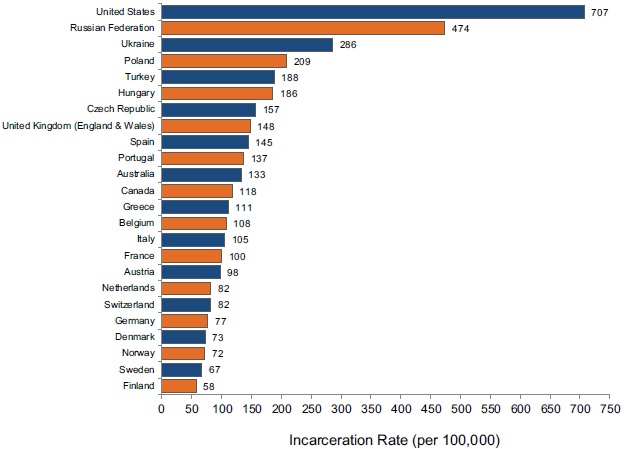
The interesting thing is America hasn’t always been like this. Here’s how much our incarceration rate has spiked domestically over the years:
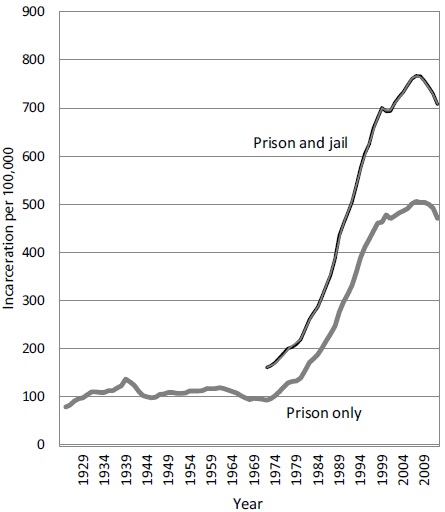
Wow. Tell me more about how mass incarceration affects people of color.
The majority of the U.S. prison population is male and under the age of 40, and a disproportionate amount of them are of people of color.
The hard data speaks volumes — incarceration rates among both blacks and Latinos have risen much faster than for whites:
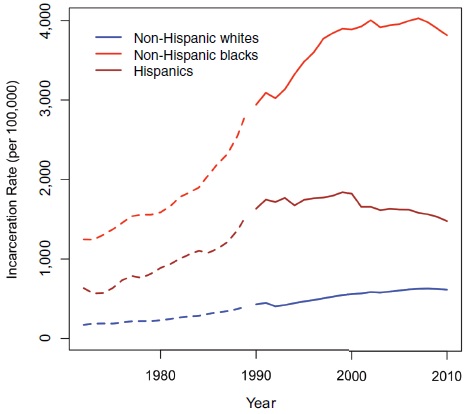
According to a 2013 report by the Sentencing Project, a research and advocacy group, one out of three black men can expect to go to prison in his lifetime, compared to one out of 17 white men. And specifically, see how blacks are disproportionately arrested for drug crimes:

This video highlights the racial bias in the American criminal justice system:
Does going to prison reform people and reduce crime?
Regarding reforming people, the answer is no. In fact, incarceration aggravates the situation. Young people of color who go to jail or juvenile detention centers have decreased literacy rates, can expect lower grades, drop out of school at a higher rate, and end up committing more crime. Beyond suffering from limited access to education or unsafe living conditions while in prison, having a criminal record makes it harder to get a job — particularly for blacks:
Racial_impact_of_criminal_record_interview_callback
Source
(As if all of the above weren’t bad enough, going to prison means you can lose the right to vote! Due to state laws that restrict convicted felons from voting, one out of 13 black Americans is disenfranchised, meaning his voice is lost in the democratic process. Learn more about Bernie’s stance on felony disenfranchisement here. )
And with regards to reducing crime, a 2014 National Research Council report — which studied years of evidence of crime trends, causes of rising prison populations, and consequences of imprisonment — concluded that nearly every aspect of our country’s “historically unprecedented and internationally unique” rise in incarceration since the 1970s has not been worth the benefit in deterrence in crime reduction. Indeed, the report recommended that the U.S. revise its current sentencing laws (particularly with regards to drug enforcement) and cut back prison rates. Learn more at the Criminal Justice issue page.
Seems like a massive problem. How does Bernie propose we address this?
Bernie ties criminal activity to lack of economic opportunities, and research shows that people behind bars are more likely to be young people of color who haven’t had access to good education or work training. As Bernie stated in a June 2015 Senate address:
“It is no great secret that, without work, without education, without hope, people get into trouble, and the result is… that, tragically, in America today we have more people in jail than any other country on Earth.”
Bernie believes we need “jobs, not jails.” To this end, he has proposed a massive bill that would put millions of Americans to work on rebuilding America’s crumbling infrastructure, another to provide job training for at-risk youths, and yet another that would raise the minimum wage — currently at $7.25 per hour, which he calls a “starvation wage” — to $15. (Learn more at the Youth Employment, Minimum Wage and Racial Wage Gap issue pages.)
Moreover, Bernie wants to increase access to education and job training, so that less youth — of color and otherwise — are pushed through the school-to-prison pipeline. In fact, America has over-invested in prisons to the point that there are more prisons than colleges in the country. To this end, Bernie’s also introduced the Free College For All Act, which aims to make all public colleges and universities tuition-free, so that everyone can afford a higher education. Finally, Bernie wants to reform sentencing laws, including eliminating mandatory minimums for non-violent offenses, and re-examining our drug policy in particular. (Learn more at the Education, Criminal Justice, and Drug Policy issue pages.)
There’s also been a lot in the news lately about people of color being the victims of police crime, right?
Sadly, yes. While black people make up only 13 percent of the population, they account for 31 percent of all victims killed by police. Blacks make up nearly 40 percent of unarmed individuals killed by police with a gun and 42 percent of unarmed individuals that are killed by police by means other than a gun.
Sobering FBI data shows that black teenagers are 21 times more likely than white teenagers to be killed by police:
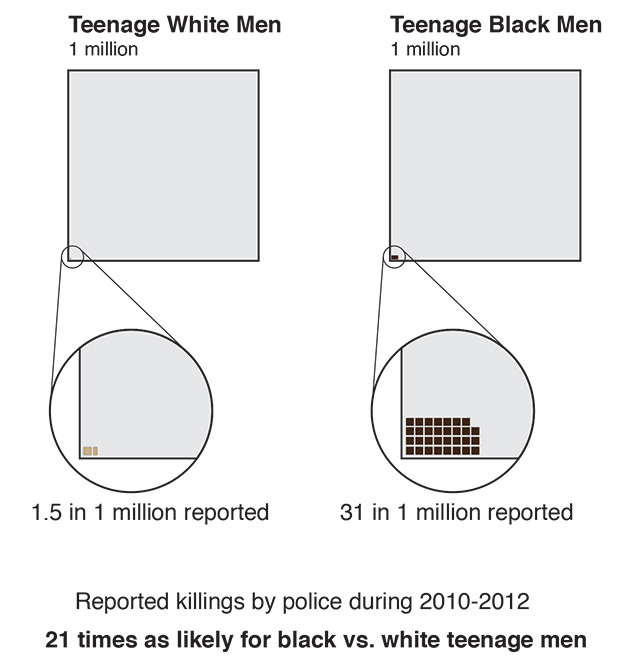
And remember that statistics on police shootings are self-reported, so this data probably underestimates this depressing state of affairs.
Where’s Bernie on all this?
In a July 2015 speech to the Southern Christian Leadership Conference (SCLC), a primarily black civil rights organization once led by Martin Luther King, Jr. that traces its roots to the Montgomery bus boycott, Bernie addressed police violence against people of color:
“Too many African-Americans today are simultaneously having to deal the crisis of racial justice while coping with the effects of poverty and economic deprivation, such as drugs, crime, and despair.
… As Martin Luther King, Jr., said; Law and order exist for the purpose of establishing justice and when they fail in this purpose they become the dangerously structured dams that block the flow of social progress.
Across the nation, too many African-Americans and other minorities find themselves subjected to a system that treats citizens who have not committed crimes like criminals. A growing number of communities do not trust the police and police have become disconnected from the communities they are sworn to protect.
Sandra Bland, Michael Brown, Rekia Boyd, Eric Garner, Walter Scott, Freddie Gray, Tamir Rice. We know their names. Each of them died unarmed at the hands of police officers or in police custody. The chants are growing louder. People are angry. I am angry. And people have a right to be angry. Violence and brutality of any kind, particularly at the hands of law enforcement sworn to protect and serve our communities, is unacceptable and must not be tolerated.
We must reform our criminal justice system. Black lives do matter. And we must value black lives.”
Bernie doesn’t see these incidents as isolated events or reflective of recent developments, stating: “Anyone who thinks this has not been going on decade after decade would be very wrong.”
He’s fighting for a vision of America where a “young black man or woman can walk down the street without worrying about being falsely arrested, beaten or killed.”
Learn more about reforming this broken system at the Criminal Justice page.
Economic Justice
Martin Luther King, Jr. believed that economic disparity was tied to racial disparity. In fact, his famous march on Washington in 1963, where King gave his seminal “I Have a Dream” speech — which Bernie was there to witness — was actually called the “March on Washington for Jobs and Freedom.” Indeed, the promotional pamphlet for the march spoke of the “twin evils of discrimination and economic deprivation.”
How do we fight for economic justice?
The first step is to acknowledge that America has a problem — one of structural economic inequality.
Today, the U.S. sees vast inequalities in both income (what we get paid) and wealth (everything we own). While some inequality is expected in any economy—and is perhaps even healthy—the U.S. today has inequalities allowing those at the top to amass (and keep) huge estates, while 22 percent of children live below the poverty line. Adults can work 40 hours a week and still not make enough to feed their families, while corporate executives in many of those same companies make much, much more.
In terms of wealth — everything we own — 90 percent of Americans control less than one fourth of the country’s wealth. The top 0.1 percent controls 21.5 percent, which is over one fifth. The amount controlled by the top 0.1 percent (the top one-tenth of one percent) is the largest it has been in over a century.
And when it comes to income — what we get paid — The bottom 90 percent make $29,840 on average, but other reports based on the U.S. Census show that 40 percent of individuals make less than $20,000 annually, and 30 percent of families live on less than $40,000 a year. We cover inequality in detail on our Economic Inequality page.
And where do people of color land in all of this?
According to a joint report by Demos and the Institute on Assets and Social Policy (IASP), “the median white household had $111,146 in wealth holdings compared to just $7,113 for the median Black household and $8,348 for the median Latino household.”
Another study IASP conducted over 25 years reveals that the wealth gap between white and African-American families rose from $85,000 in 1984 to $236,500 in 2009.
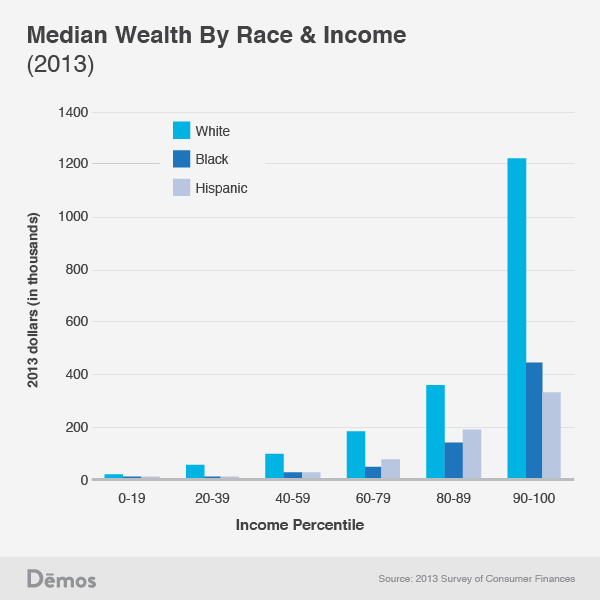
The Harvard Business Review Compared median weekly salaries from the Bureau of Labor Statistics (BLS), revealing a lot about how race and gender relate to pay:
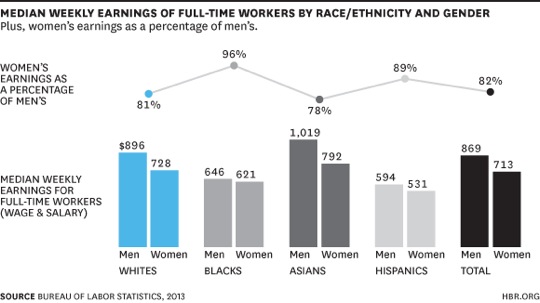
Comparing median weekly salaries from the U.S. Population Survey in 2013, we see that a median black male earns 75.1 cents for every dollar a median white male earns. A median Latino male earns only 67 cents. According to the same data, a median white woman makes 78 cents compared to a white male, and black and Latina women follow making 64 cents and 54 cents, respectively. We see that the racial wage gap is large, and that both gender and race are important factors when examining the wage gap.
(On the other hand, Asian men and women make more than anyone in America, also according to the BLS — although this may be explained by the fact they have a higher average educational attainment.)
Is it harder to get an interview as a person of color in the United States?
It appears to be the case. Researchers at the National Bureau of Economic Research (NBER) published an experiment in which they sent thousands of resumes to various help-wanted ads in Chicago and Boston. Some resumes bore the white-sounding names “Emily” and “Greg”, and others had the black-sounding names “Lakisha” and “Jamal”. Those with white-sounding names got one callback for every 10 applications; those with black-sounding names got one only every 15. (It is worth noting that this study did not check hiring rates or earnings.)
A story that went viral in 2014 seems to confirm the NBER results with regards to Latinos. A Mexican-American L.A. resident named José Zamora detailed how his job search was going nowhere until he changed his name on his resume from José to Joe — editing nothing else — and started getting callbacks from the same jobs that had ignored him previously.
What other contributors are there to the racial wage gap?
According to a 2001 paper by two labor economists, about half of the racial wage gap can be attributed to differences in work experience, differences in time out of the workforce, and differences in amount of education gained. Differences in amount of education gained contribute more to the Latino wage gap, while differences in experience and time out of the workforce contribute more to the black wage gap.
The same paper goes on to explain blacks in America suffer from a lower labor force participation for several reasons. When displaced from work, black workers take significantly longer than white workers to find new work. Those black people with a criminal record find it much harder than white people with a criminal record to find work. Since black people are incarcerated at a higher rate, this has a multiplicative decreasing effect on labor force participation.
Additionally, the researchers notes that black unemployment is likely understated since incarcerated individuals are not included in the statistic. (Learn more about Bernie’s stance on mass incarceration.)
Presumably communities of color are pretty concerned about the economy and getting jobs?
Definitely. In fact, Latinos care more about the economy and education (which is a way to get better jobs) than anything else:
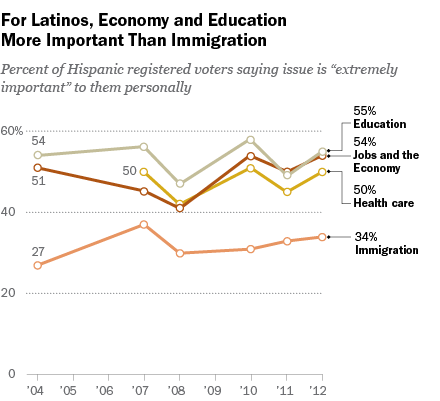
And blacks put scarcity of jobs paying decent wages at the top of their concerns list:
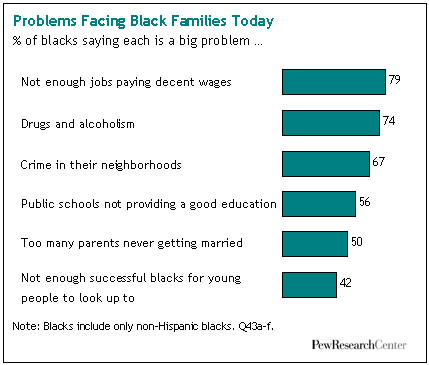
How has Bernie worked to address the education and training gap?
In May 2015, Bernie introduced the College for All Act to help increase access to higher education, by making all public colleges and universities tuition-free. Moreover, his youth employment bill would include job training for at-risk youth.
These measures would provide those coming from low-income backgrounds a better chance to access the kind of education and training that would enable them to gain the skills that provide access to better economic opportunities.
And how about the criminal record issue which affect people of color’s ability to get jobs?
Bernie has also come out against various contributors to over-incarceration of people of color. He has said that prison money would be better spent on job training and education. Bernie has also declared the “war on drugs” largely a failure as it has incarcerated far too many non-violent offenders. Instead, he favors reforming our drug policy and criminal justice system to focus on rehabilitation instead of senseless punishment.
If you skipped the previous section on Bernie’s stances on criminal justice reform with regards to people of color, go back and learn more.
What has Bernie done to address racial discrimination when applying for jobs?
Bernie has supported expanding laws that protect against discrimination. As recently as November 2013, he voted for the Employment Non-Discrimination Act.
Lots of people of color can’t make ends meet due to rising healthcare costs.
That’s absolutely true. The below graph shows how important it is to fight against the racial disparities and inequalities inherent in our health system:
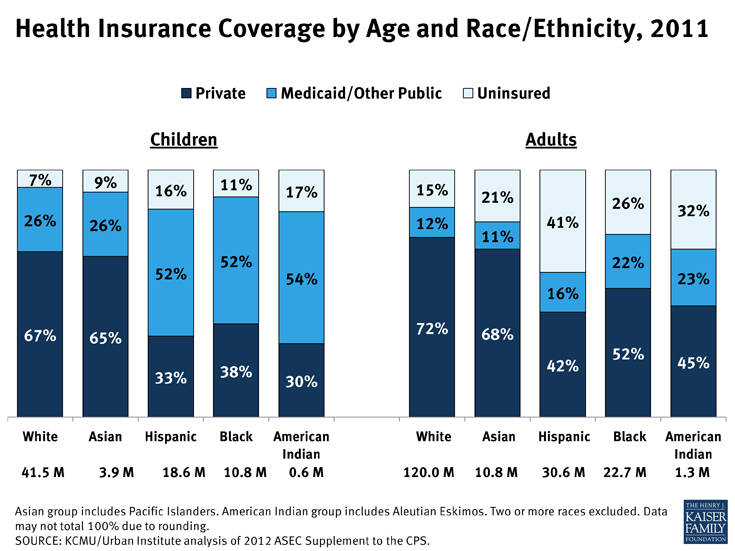
That’s why Bernie advocates for universal healthcare. Though he has consistently supported the expansion of Medicaid coverage while fighting repeated efforts to cut funding for it, and voted for the Affordable Care Act (a.k.a. “Obamacare”), Bernie believes America hasn’t gone far enough to provide adequate healthcare for all.
Moreover, he’s sponsored legislation to curb drug costs and tackle fraud in the industry. He also wants to increase access to affordable housing and childcare, as well as the expansion of Social Security and nutrition programs. You can learn more about all of Bernie’s healthcare and public assistance policies at the Social Safety Net category page.
What about policies that keep Americans from falling into the “safety net” in the first place?
The cornerstone of Bernie’s policy is addressing economic inequality — and he’s long fought for everyday working Americans. In fact, one of the very first bills he introduced to Congress was the Liveable Wage Act of 1993, a bill to increase the minimum wage which he reintroduced several times thereafter.
Years later, he’s still fighting for this cause. A major plank of Bernie’s presidential campaign is to more than double the federal minimum wage to $15 per hour, up from $7.25 per hour.
How would that help?
Over the past 40 years, the cost of living has increased significantly while workers’ wages have remained flat despite commensurate increases in the level of productivity. Learn more at the Minimum Wage issue page.
It’s all moot though if we can’t generate more jobs, right?
Exactly. Bernie believes the fastest way to create millions of jobs is to rebuild our crumbling infrastructure — and he’s been saying so for decades. In his introduction to the The Rebuild America Act of 2015, he noted:
“There’s a reason that investing in our infrastructure has traditionally enjoyed bipartisan support in Congress. It’s a good idea. It creates jobs, income, profits and tax revenues. It lays a foundation for the efficient operation of our economy in the future.”
Want to know more about how this idea could generate better-paying jobs for millions of Americans? Check out the Infrastructure issue page.
Voting Rights
Unfortunately, various voter suppression tactics very directly affect people of color’s ability to participate in our democratic process. Bernie feels strongly about combating voter ID laws and addressing felony disenfranchisement.
Is voter suppression really still happening?
Sadly, various tactics are used to disenfranchise certain segments of our population. Common methods of voter suppression include last-minute changes to polling locations and hours, reducing the number of polling places, and enacting voter ID laws which suppress voters without a driver’s license.
In 2013, the Supreme Court gutted the Voting Rights Act of 1965, a landmark bill passed to combat voter suppression at the ballot box, particularly against people of color. The ruling outlawed a key requirement in the 1965 bill which required states with a history of racial discrimination at the poll to “preclear” any changes to electoral laws with the federal government before enacting them. This change allowed nine states to change election laws without federal approval, mostly to introduce voter ID laws.
What are voter ID laws?
Laws that require people to show an ID before being able to vote. They’re ostensibly supposed to combat voter fraud but many experts believe the rate of incidence is far too overblown to accept that the threat is credible.
Why is this a racial justice concern?
Such laws suppress people of color so much more than others:
percentage-voters-asked-for-id
How does Bernie think we can fight back?
In June 2015, Bernie co-sponsored the Voting Rights Advancement Act, which would increase federal oversight of elections in states with a history of racial discrimination and voter suppression. The bill proposes that the “preclear” is required in states where there have been repeated voting rights violations in the previous 25 years. Hopefully this will address the proliferation of voter ID laws across the country.
Good. Every American citizen should have the right to vote!
Agreed, but some citizens are actually explicitly denied those rights by law. Certain states restrict people with felony convictions from voting — even after they’ve served their time and paid their debt to society. It’s estimated that 5.85 million Americans have been legally stripped of their voting rights. And due to racial disparities in the criminal justice system, this disproportionately affects people of color. In fact, one in 13 blacks do not have the right to vote because of this.
But doesn’t being a felon mean you forfeit your freedoms?
You’re still protected by the Constitution even if you commit a crime. Beyond suffering from limited access to education or safe living conditions while in prison, disenfranchisement follows former felons for the rest of their lives. The U.S. is one of the strictest nations in the world with regards to felony disenfranchisement.
Sounds bad. What’s the impact?
This directly threatens the notion of universal suffrage, limits free speech, and contradicts the right to representation inherent in our Constitution. Voting rights are essential to keeping inmates connected to civic life and providing them with a better foundation for rejoining society once they serve their time. Critics argue that felony disenfranchisement is a “potent tool in the campaign to undercut African-American political power” because it so disproportionately impacts blacks.
So, to the extent that people of color are over-represented in our prison system, they are under-represented in our political system. This graph shows the extent of felon disenfranchisement nationwide:
felony-disefranchisement-map
Where does Bernie stand on this?
Bernie has long been a supporter of universal suffrage and proudly represents Vermont, one of two states that do not restrict the voting rights of anyone convicted of felonies. In March 2015, Bernie co-sponsored the Democracy Restoration Act, which seeks to reinstate voting rights to people who have served their time and have been freed from prison.
Learn more about how Bernie is working to make the electoral system work for regular Americans, including those of color, at the Political Reform page.
Housing Discrimination
Residential segregation and lack of access to quality affordable housing has a pervasive and disproportionate impact on people of color. Explicit acts of housing discrimination that defined America before the Fair Housing Act of 1968 (e.g., Jim Crow, Black Codes, “sundown towns”) may be in the past, but we’ve hardly solved the problem.
According to a 2012 study by the U.S. Department of Housing and Urban Development and the Urban Institute, “subtle forms of housing denial stubbornly persist.”
white-home-seekers-favored
Then there’s the problem of residential segregation, which persists in our cities and towns in spite of the Fair Housing Act.
But we’re so diverse. How could this still be a problem in melting pot America?
Let’s start by sharing some statistical context. There’s a measure called the “index of dissimilarity” that researchers use to determine the rates of housing segregation in a particular geographic area. In an extreme case like Apartheid-era South Africa, where whites lived in all-white neighborhoods and blacks lived in all-black neighborhoods, the index of dissimilarity would peak at 100. In an area where people were randomly distributed irrespective of racial background, the index would be 0.
In the 2010 census, Houston had an index of dissimilarity of 61 for its black and white populations. This is considered moderately high and indicates that either 61 percent of whites or 61 percent of blacks would have to move to new neighborhoods in order to achieve perfectly-integrated distribution. Los Angeles had an index of 68, Chicago had an index of 76, and New York City had an index of 78.
Find out more about segregation in your own community by using this interactive map to explore segregation all over America.
Yikes. I guess we are still quite segregated. What are some of the causes?
There are several factors that contribute to housing and residential segregation. Let’s take a common one: gentrification.
As a result of disinvestment on the heels of “white flight,” cities can withdraw public funds and services like building maintenance, garbage collection, and school funding in areas deemed to be low priority. Need an example? Check out Detroit.
This leads to deteriorating property values and quality of life. But if and when money floods back into these neighborhoods, it can leave poorer residents without access to capital behind — forcing people out of their homes when they can’t afford steep increases in rent or property taxes.
Other factors to consider are real-estate discrimination, socioeconomic status, and the lasting legacy of America’s discriminatory housing policies.
What has Bernie done about it?
He has been a longtime advocate for fair and affordable housing. In his 1981 mayoral campaign in Burlington, Vt., he ran against the incumbent’s plans to raise property taxes and “proposed raising taxes on commercial property instead.”
Once in office, the city required property owners to give residents two years notice before their apartments could be converted to condos as well as giving renters the preemptive right to buy converted units. Bernie prevented landowners from bulldozing affordable-housing units unless they first built an equal number of new units, and he implemented economic development projects and a communal land trust for affordable housing — policies considered radical in the early ‘80s but which are more commonplace today.
As a senator, he’s fought to create the Health Trust Fund, which targets excess profits from Fannie Mae and Freddie Mac to provide a new dedicated revenue source for states to finance very-low-income rental housing construction and rehabilitation projects.
The Conversation About Race
Bernie sees America’s persistent racial imbalances as a multi-layered problem. We must tackle discrimination inherent in the criminal justice system through sentencing reform and programs like community policing. Moreover, nothing will change if we don’t address the root causes of economic inequality and confront the hard truths of America’s history of racial injustice — from its roots in slavery to misguided policies meant to address the disparities today.
Want to know more about Bernie’s views on the subject? Check out this video:
Read more about Bernie’s racial justice policy platform at his campaign’s site. And get a more in-depth look at his perspective and policies on the rights of specific groups of color, visit the Black Rights, Latino Rights, and Native American Rights issue pages.
Immigration
“This country was built by immigrants,” Bernie has said. He believes we must reform our immigration system to invite greater innovation, diversity, and economic opportunity, and further must endeavor to fight racial discrimination against our immigrants of color.
How many immigrants are there in the country?
As of 2013, there are 41.3 million foreign-born people living in the United States.
What are the racial demographics of our immigrant population?
Given that only 48 percent of the foreign-born reported their race as white, most immigrants here are people of color.
Additionally, 26 percent self-reported as Asian, 15 percent as some other race, and more than two percent as having two or more races. Finally, 46 percent — or 19 million people — reported having Latino origins. As Latino is an ethnic and not a racial category, it’s hard to discern exactly how many of those are people of color.
What are Bernie’s views on immigration generally?
Bernie believes America’s current immigration system is broken and requires comprehensive reform. An important aspect of immigration reform, according to Bernie, is to establish some pathway to legal residency or citizenship for the 11 million undocumented workers living in the United States so that they need not work and live in the shadows.
While he believes that border security is important for the country, Bernie doesn’t believe that a fence is the way to achieve that security. Finally, Bernie believes that our visa system must protect American jobs instead of simply allowing corporations to score cheap labor via temporary work visas.
What are some racial justice issues our country faces with regards to immigration?
While not always correlated, language and race are closely entwined within the immigrant population, particularly given that most immigrants in the U.S. are people of color.
Attempts to make English the official language of the United States have been described as a way to circuitously make it legal for private and public entities to discriminate against people who cannot speak, read or write in English.
For instance, if English were legally designated as the national language, a government agency might be able to argue that it need not provide forms or information in any other language, hindering many immigrants’ ability to access social services and other essential public programs, not to mention basic information. In turn, this might discourage certain foreign-born from staying in America or deciding to come here.
What has Bernie done around language discrimination?
Bernie voted in 2007 against legislation that would have declared English the official language of the U.S. government, so as to enable government materials to still be available in other languages. In 2008, Bernie voted against a bill that would have cut funding from programs that would support people who had been fired from their jobs by employers who used their lack of English proficiency as an excuse.
Are there elements of economic exploitation of immigrants in the United States? And is there a racial element to it?
Unfortunately, yes. Bernie is very concerned with the exploitation of undocumented workers and their standard of living. He believes that such immigrants “have been routinely cheated out of wages, held virtually captive by employers who have seized their documents, forced to live in unspeakable inhumane conditions and denied medical benefits for on-the-job injuries.”
In a July 2015 speech, Bernie highlighted that “undocumented workers are doing the extremely difficult work of harvesting our crops, building our homes, cooking our meals, and caring for our children. They are part of the fabric of America.”
The racial element comes into play with the fact that of the 11 million undocumented people in America, 52 percent of the undocumented population are Mexicans alone. While we can’t know exactly what the racial breakdown is among those, it’s likely that many or even most are people of color. And while more precise demographic data about undocumented people in the U.S. is necessarily difficult to come by — they are undocumented after all! — they are likely comparably diverse to our general immigrant population, which consists mostly of people of color.
How does Bernie want to address the economic exploitation of undocumented workers of color, and otherwise?
Given that Bernie believes undocumented workers are already part of the nation’s “fabric,” they should have a path to citizenship that will allow them to be fully participating members of American society and contributors to its economy.
“Bringing undocumented workers out of the shadows will make it more difficult for employers to undercut the wages and benefits of all workers.”
Check out the Immigration and Latino Rights issue pages for more on Bernie’s stance on these topics.
http://feelthebern.org/bernie-sanders-on-racial-justice/